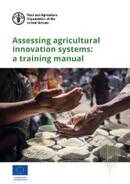المطبوعات
The global impacts of the climate crisis are becoming ever clearer, and natural resources and ecosystems are being depleted. Despite some progress, hunger and poverty persist, and inequalities are deepening. The world is realizing that unsustainable high external inputs and resource-intensive industrialized systems pose a real danger of biodiversity loss, increased greenhouse gas emissions, shortages of healthy food, and the impoverishment of dispossessed peasants around the world. There is global consensus on the urgent need for a transition to agri-food systems that ensure food and nutrition security, social and economic equity, and sustain the ecosystem on which all these elements...
In the rapidly changing context of agri-food systems, extension and advisory services (EAS) are expected to provide new roles and services that go well beyond the traditional production-related technology transfer. Consequently, pluralistic EAS systems with diverse actors have emerged with diverse actors, including private and civil society organisations. These multiple EAS actors must adopt innovative entrepreneurship models if they are to act proactively and respond to the increasing diversity of farmers’ demands while staying independent and sustainable. Entrepreneurship in EAS means applying innovations such as creative and sustainable business models that can capture opportunities and new ideas, broaden the range...
This training manual, which is based on a methodology developed by FAO’s Research and Extension Unit (OINR), presents a training course on assessing AIS consisting of eight modules. After completing the training, trainees will achieve the following specific objectives: be familiar with the concept of agricultural innovation systems (AIS) and the Tropical Agriculture Platform’s (TAP) approach to capacity development on AIS; Be familiar with the FAO framework on assessment of AIS and the approaches and tools to use in each step, and; be able to plan and carry out an assessment of AIS and using results in policies and programmes....
El propósito de esta guía es contribuir al desarrollo de las capacidades funcionales entre individuos y organizaciones que apoyan la innovación en América Latina. En la guía se ha utilizado el marco común para el desarrollo de capacidades promovido por la Plataforma de Agricultura Tropical (TAP, por sus siglas en inglés), con el fin de identificar y reforzar las capacidades funcionales clave en organizaciones e individuos. De acuerdo con marco común, el fortalecimiento de las capacidades funcionales permite a los actores reflexionar y aprender, colaborar, navegar la complejidad, y participar en estrategias y procesos políticos. Además, permite enfocar en el...
Extension and advisory services (EAS) play a key role in facilitating innovation processes, empowering marginalized groups through capacity development, and linking farmers with markets. EAS are increasingly provided by a range of actors and funded from diverse sources. With the broadened scope of EAS and the growing complexity of the system, the quantitative performance indicators used in the past (for example related to investment, staffing or productivity) are no longer adequate to assess the performance of EAS systems. This operational guide meets the longstanding demand for guidance on undertaking such a comprehensive assessment of national EAS systems. It provides detailed...




